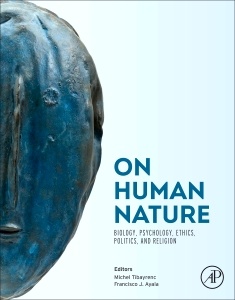On Human Nature Biology, Psychology, Ethics, Politics, and Religion
Coordonnateurs : Tibayrenc Michel, Ayala Francisco J.

On Human Nature: Biology, Psychology, Ethics, Politics, and Religion covers the present state of knowledge on human diversity and its adaptative significance through a broad and eclectic selection of representative chapters. This transdisciplinary work brings together specialists from various fields who rarely interact, including geneticists, evolutionists, physicians, ethologists, psychoanalysts, anthropologists, sociologists, theologians, historians, linguists, and philosophers.
Genomic diversity is covered in several chapters dealing with biology, including the differences in men and apes and the genetic diversity of mankind. Top specialists, known for their open mind and broad knowledge have been carefully selected to cover each topic. The book is therefore at the crossroads between biology and human sciences, going beyond classical science in the Popperian sense.
The book is accessible not only to specialists, but also to students, professors, and the educated public. Glossaries of specialized terms and general public references help nonspecialists understand complex notions, with contributions avoiding technical jargon.
Part I. Biological Basis of Human Diversity1. The Advent of Biological Evolution and Humankind: Chance or Necessity?2. Hominins: Context, Origins, and Taxic Diversity3. The History of Early Homo4. The Contribution of Genetic Ancestry From Archaic Humans to Modern Humans5. World Dispersals and Genetic Diversity of Mankind: The Out-of-Africa Theory and Its Challenges6. Human Population Variability and Its Adaptive Significance7. Evolution and Implications of Genomic Diversity on “Human Kind in India8. The Human Brain: Evolution and Distinctive Features9. How Different Are Humans and “Great Apes? A Matrix of Comparative Anthropogeny10. Human Intergroup Variation and Disease Genetics11. Natural Selection Associated With Infectious Diseases12. Aging, Somatic Evolution, and Cancer13. Evolution of the Human Leukocyte Antigen System14. Human Life History Evolution: New Perspectives on Body and Brain Growth15. Gorillas in Our Midst? Human Sexual Dimorphism and Contest Competition in Men16. The Human Family: Evolutionary Origins and Adaptive Significance17. Biological Future of Humankind: Ongoing Evolution and the Impact of Recognition of Human Biological Variation
Part II. Psychology, Behavior and Society18. Gene-Culture Models for the Evolution of Altruistic Teaching19. Multiple Origins of Agriculture in Eurasia and Africa20. The Quantum Origin of Life: How the Brain Evolved to Feel Good21. Empathy, Theory of Mind, Cognition, Morality, and Altruism 22. Cognitive Ethology and Social Attention23. Human Sociobiology and Group Selection Theory24. Behavior Analysis, Darwinian Evolutionary Processes, and the Diversity of Human Behavior25. A Psychoanalyst Views the Self Across Civilizations26. Biological and Social Causation of Serious Mental Illness27. The Flexible Psychological Concept of Normality28. Diversity and Hierarchy in the Evolution of Mental Mechanisms29. Human Diversity at the Individual and Population Levels, and Societal Hierarchies30. Homosexuality and Evolution: A Critical Appraisal31. The Roots and Individual Diversity of Addiction 32. Human Variability and the Origins and Evolution of Language33. Human Evolution and Progress34. Culture, Brain, and Behavior: The Implications of Neural Plasticity and Development on Social Contexts and Political Structures
Part III. Ethics, Politics and Religious Considerations35. Adaptive Significance of Ethics and Aesthetics36. The Politics of Human Nature37. The Race/Ethnic Debate: An Outsider's View38. Social Darwinism39. History and Diversity of Religion40. Religion Viewed From Different Sciences41. Universal Humanity, Religious Particularity, and Scientific Reductionism42. Evolution and the Future of Medicine43. The Impact of Modern Medicine on Human Evolution44. Science and Technology in Human Societies: From Tool Making to Technology45. Biology, Psychology, Ethics, and Politics: An Innate Moral Sense?46. What HIV Has Taught About the Interactions Between Biology, Culture, and Other Evolving Systems
Dr. Michel Tibayrenc has worked on the evolution of infectious diseases for more than 45 years. He is a director of research emeritus at the French Institut de Recherche pour le Developpement (IRD) and the founder and editor-in-chief emeritus of the Elsevier journal Infection, Genetics and Evolution. From 1996-2021 he was the founder and principal organizer of Elsevier’s international MEEGID congress (Molecular Epidemiology and Evolutionary Genetics of Infectious Diseases). He has held professional appointments in France, Algeria, French Guiana, Bolivia, Thailand, and the United States; is the cofounder of the Bolivian Society of Human Genetics; and is a fellow of the American Association for the Advancement of Science.
Francisco J. Ayala is University Professor and Donald Bren Professor of Biological Sciences and Professor of Philosophy at the University of California, Irvine. Dr. Ayala is a member of the National Academy of Sciences (NAS), a recipient of the 2001 National Medal of Science, and served as Chair of the Authoring Committee of Science, Evolution, and Creationism, jointly published in 2008 by the NAS and the Institute of Medicine. Dr. Ayala has received numerous awards, including the 2010 Templeton Prize for “exceptional contribution to affirming life’s spiritual dimension, and 23 honorary degrees from universities in ten countries. He has been President and Chairman of the Board of the American Association for the Advancement of Science and President of Sigma Xi, the Scientific Research Society of the United States. Dr. Ayala has written numerous books and articles about the intersection of science and religion, including Darwin’s Gift to Science and Religion (Joseph Henry Press, 2007), Am I a Monkey? (Johns Hopkins University Press, 2010), and The Big Questions. Evolution (Quercus, 2012). He is also the author, with Camilo J. Cela-Conde, of Human Evolution. Trails from the Past (Oxford University Press, 2007). He teaches classes in
- Provides greater understanding of diversity and population structure and history, with crucial foundational knowledge needed to conduct research in a variety of fields, such as genetics and disease
- Includes three robust sections on biological, psychological, and ethical aspects, with cross-fertilization and reciprocal references between the three sections
- Contains contributions by leading experts in their respective fields working under the guidance of internationally recognized and highly respected editors
Date de parution : 09-2016
Ouvrage de 814 p.
21.5x27.6 cm



